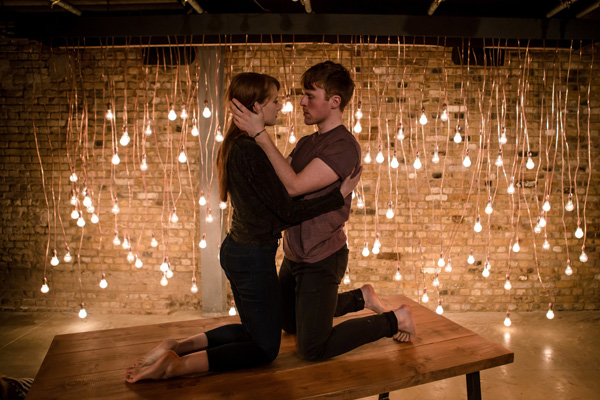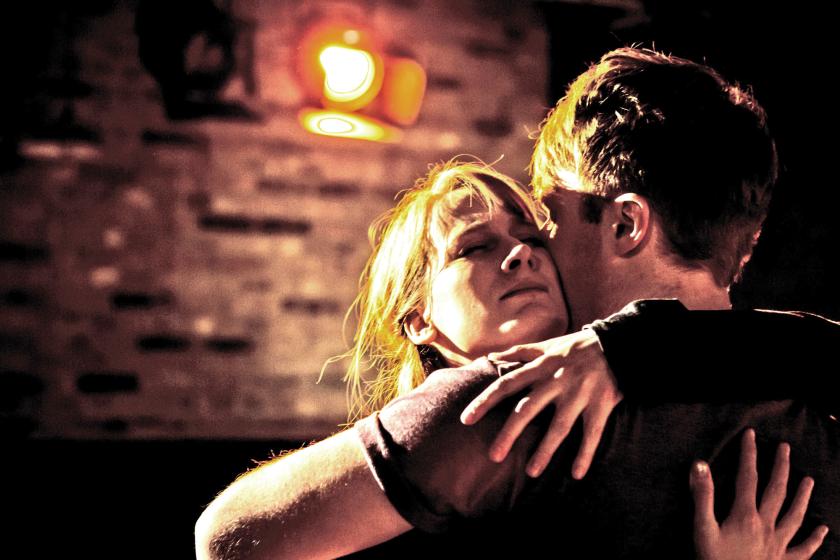Despite the age of austerity, London theatre is booming. Not just the West End, but Off-West End and the fringe as well. One sign of its health is its openness to Continental imports, especially to plays that have been transposed into English by their own authors. If the market leader of this trend is Croatian-born Tena Štivičić’s 3 Winters, then the latest example is Maria Milisavljevic’s often equally compelling Abyss.
This play originally opened as Brandung at the Deutsches Theater in Berlin in 2013, and is still running in that venue’s repertory. It won the prestigious Kleist Award for Young Dramatists, and another production has recently opened at the Tarragon Theatre in Toronto. Now, in a version directed by Jacqui Honess-Martin, London audiences at the ever-enterprisng Arcola Theatre get a chance to see this poetically written story about a missing woman.
The guilt and longing of the characters take centre stage
The events are inherently painful: one freezing cold night in Germany, four friends are having a party. Shit, they’ve run out of cheese. So 24-year-old Karla nips out to the shop, and doesn’t come home. The other three – her boyfriend Vlado, her best friend and female narrator, and the narrator's sister Sophia – begin with desperate attempts to convince the police that she is missing for sinister reasons, and then start to search for her themselves. The suddenness and inexplicable nature of their loss results in a variety of trauma.
Gradually, the family life of Vlado emerges. His mother is Croatian; his father is Serbian. This means that he’s seen as suspect by the German police, who are as racist as you’d expect. At the same time, the politics of the former Yugoslavia and the history of the Balkans haunt the imagination of the European heartlands, seeping into the troubled heart of the play like black ink in stale water. Milisavljevic chooses to talk about these issues not in the form of journalism, but as a nightmare deeply rooted in feeling.
 Images pile up on images, as screams echo through tempests, while skies burn and seas boil and bubble. Waves smash on far-off shores. Poetic passages evoke the horror of nightmares, as the guilt and longing of the characters take centre stage. At times, this is enthralling playwriting, but it also has its problems. Often the feelings of the protagonists are clearer than the narrative of the story, which is rather obscure at the best of times. Sophia’s episodic account of the skinning of a rabbit, a metaphor as strong as the central idea of an emotional abyss, is powerful but not immediately comprehensible.
Images pile up on images, as screams echo through tempests, while skies burn and seas boil and bubble. Waves smash on far-off shores. Poetic passages evoke the horror of nightmares, as the guilt and longing of the characters take centre stage. At times, this is enthralling playwriting, but it also has its problems. Often the feelings of the protagonists are clearer than the narrative of the story, which is rather obscure at the best of times. Sophia’s episodic account of the skinning of a rabbit, a metaphor as strong as the central idea of an emotional abyss, is powerful but not immediately comprehensible.
As a play about loyalty, sexual passion and family ties, Abyss is complex and gradually almost hypnotic in a kind of incantatory way. A subplot about the relationship between the narrator and her new boyfriend Jan adds the theme of disturbed masculinity, which sometimes reminded me of Abi Morgan’s brilliant Tiny Dynamite (2001). Sadly, this magic is broken by an unnecessary interval in Honess-Martin's otherwise enthralling and physically fluid, often inventively so, production.
Her directing is elegant, both delicate and direct, with a good pace and attractive cast: Nicola Kavanagh portrays the narrator with a light touch, aching, reasoning and yearning. Iain Batchelor plays both the mild Jan and the passionate Vlado, while Jennifer English portrays the coolly efficient and tightly wound-up Sophia. They are all well served by designer Lucy Sierra’s bare set, with its hard table, gymnastic bars and lightbulb sculpture, which flickers and blazes beautifully. Like the rest of the play, this mini-symphony of lights is both fascinating and a bit estranging.















Add comment